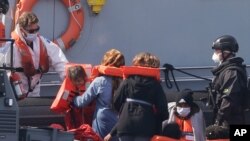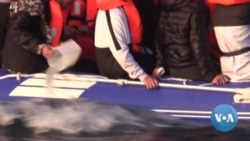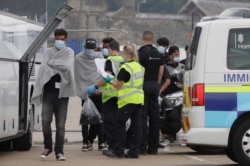British and French ministers meet Tuesday in Paris for urgent talks on the growing migrant crisis in the English Channel. So far this year, more than 4,000 migrants, mostly from Africa and the Middle East, have attempted the crossing from France to Britain in overcrowded dinghies or makeshift boats, including around 700 in the past week.
It is a voyage of some 35 kilometers across the busiest shipping lane in the world. Among the migrants are hundreds of unaccompanied children.
The surge in arrivals is creating political waves. Speaking to reporters in London Monday, British Prime Minister Boris Johnson promised action, but with little detail.
“We need to stop them, working with the French, we need to stop them from getting across the channel. But No. 2, we need to look at the legal framework that we have, all the panoply of laws that an illegal immigrant has at his or her disposal that allow them to stay here,” Johnson said.
Immigration Minister Chris Philp was traveling to Paris for talks Tuesday, alongside Britain’s new so-called “Clandestine Channel Threat Commander,” Dan O'Mahoney, for talks with French counterparts on how to reduce the number of migrant crossings. One plan under discussion could see Britain paying more for land patrols along the northern French coastline.
In recent days Britain has deployed naval vessels and spotter aircraft to the English Channel. Former Royal Navy officer Chris Parry says it is right to involve Britain’s armed forces. “It's quite clear that we do not have a grip on our maritime border. It's unsafe, it's insecure and there's illegal operations taking place on both sides of the channel and also in the channel itself,” Parry told Britain’s Sky News Monday.
It is not clear what role the naval and air force assets will play. Colin Yeo, an immigration lawyer and author of the book Welcome to Britain: Fixing Our Broken Immigration System, told VOA in an interview Monday that forcibly pushing migrant boats away from British waters would break numerous maritime and international laws.
“You can’t just push people back and stop them from going any further and hope that they don’t drown, because basically some people are going to drown and that’s just completely unacceptable. You can’t tow them into French waters without the consent of the French,” Yeo said.
Under international maritime law, all vessels are obliged to aid those in distress at sea. Deploying the navy could have unintended consequences, says Yeo.
“There is a humanitarian argument for making sure that people are safe in that area and taking them back to shore. But if it were the British who were doing that, it would be back to a British shore and that is exactly what the British government is seeking to avoid.”
Under European Union law known as the Dublin Regulation, the first EU country where a migrant arrives is meant to process any asylum request. Britain has deported hundreds of migrants to its European neighbors in recent years under the arrangement. When Britain exits the Brexit transition period at the end of the year, however, that law no longer applies.
“You cannot just send people back to a country that won’t take them back,” says Yeo. “I think what the U.K. government would ideally like is to have some sort of arrangement where if somebody is intercepted in the English Channel, the assumption would be that they’ve come from France and therefore they are landed in France. But we don’t have that agreement at the moment, and frankly it doesn’t seem that likely that we would enter into such an agreement with the French because it doesn’t necessarily appear to be in French interests.”
Activists say the surge in arrivals shows the desperation of the migrants and Britain should be doing more to help the global refugee crisis.
“Clearly, the numbers are higher this year, but I think as a country, as a government, every time we see incidents like this, you've got two kind of choices to make,” Stephen Hale, chief executive of charity group Refugee Action, told the Reuters news agency Tuesday.
“The first is to say this is serious for the people concerned, but it's a modest movement by international standards, and it's certainly something that Britain can cope with. You know, it's something we can step up and find solutions to in the interests of our country and in the interests of these people. Or we can kind of go the other way and really send the message that these numbers are huge. It’s not something we can manage,” Hale said.
The British government says the route must be shut down to prevent tragedy at sea.
Analysts say that politically, the images of migrant boats arriving at the foot of Britain’s iconic white cliffs of Dover are clearly potent for a government that pledged to take back control of its borders after Brexit.








